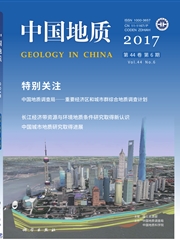

 中文摘要:
中文摘要:
桑合地区是白音查干凹陷的一个重要含油区,其基础地质研究比较薄弱。综合运用岩心和录测井资料,结合区域地质背景.对白音查干凹陷桑合地区都红木组一段的沉积相类型及其分布、演化特征进行了全面系统的研究。结果表明.研究区都一段主要发育扇三角洲、湖泊和滑塌浊积扇三种沉积相类型。平面上从凹陷边缘至中心、垂向上自下而上,沉积物粒度由粗变细,沉积相由扇三角洲相、滨浅湖相渐变为半深湖-深湖相。利用岩石组分和重矿物成分进行物源分析.认为桑合地区沉积物来自凹陷北部的巴音宝力格隆起,并具有多期次、阵发性、近物源的特点,母岩岩性主要为沉积岩.其次为岩浆岩.见少量变质岩。
 英文摘要:
英文摘要:
Sanghe area is an important oil-bearing zone in the Baiyinchagan Sag. Oil exploration in the Baiyinchagan Sag has been carried out for many years, but fundamental geological data of Sanghe area remain insufficient. Based on a comprehensive analysis of core and logging data, regional geological setting, sedimentary facies types of the 1st Member of Lower Cretaceous Duhongmu Formation in Sanghe area of Baiyinchagan Sag, the authors made a systematical study of their distribution and evolution characteristics. The results show that three types of sedimentary facies are developed in this area, namely fan delta, lacustrine fan and slump turbidite fan facies. From the margin to the center, the granuhrity of sediments becomes finer and the facies are gradually developed from fan deltas or shore-shallow lake to semi-deep lake. The same evolution regularity is observed from the bottom to the top. Based on an analysis of clastic particle types and heavy minerals of the sandstone, the authors hold that the sediments of the 1st Member of Duhongmu Formation in Sanghe area must have come from Bayinbaolige swell situated in the north of the Baiyinchagan Sag, with the characteristics of multiphase, spasm and being adjacent to the source rocks. The results also suggest that the source rocks are mainly sedimentary rocks and subordinately igneous rocks as well as small amounts of metamorphic rocks.
 同期刊论文项目
同期刊论文项目
 同项目期刊论文
同项目期刊论文
 Sealing mechanism for cap beds of shallow biogenic gas pools in Late Quaternary deposits of the Qian
Sealing mechanism for cap beds of shallow biogenic gas pools in Late Quaternary deposits of the Qian Sedimentary characteristics and evolution for late Quaternary incised valley fills (the Qiantang Riv
Sedimentary characteristics and evolution for late Quaternary incised valley fills (the Qiantang Riv Exploration methods for late Quaternary shallow biogenic gas reservoirs in the Hangzhou Bay area, ea
Exploration methods for late Quaternary shallow biogenic gas reservoirs in the Hangzhou Bay area, ea 期刊信息
期刊信息
